课前预习晨背 Unit 4 Global warming
unit4globalwarming单词和句型重点总结
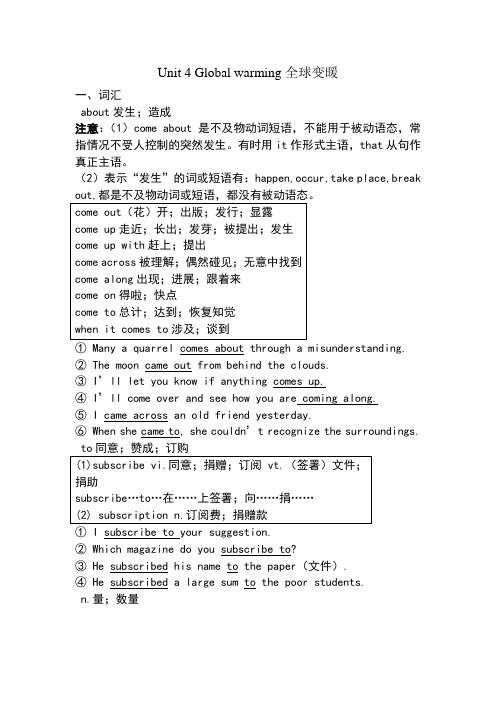
Unit 4 Global warming全球变暖一、词汇about发生;造成注意:(1)come about是不及物动词短语,不能用于被动语态,常指情况不受人控制的突然发生。
有时用it作形式主语,that从句作真正主语。
(2)表示“发生”的词或短语有:happen,occur,take place,break① Many a quarrel comes about through a misunderstanding.② The moon came out from behind the clouds.③ I’ll let you know if anything comes up.④ I’ll come over and see how you are coming along.⑤ I came across an old friend yesterday.⑥ When she came to, she couldn’t recognize the surroundings.① I subscribe to your suggestion.② Which magazine do you subscribe to?③ He subscribed his name to the paper(文件).④ He subscribed a large sum to the poor students.n.量;数量① It’s cheaper to buy goods in quantity / in large quantities.② A large quantity of silk is sold in Japan.③ A large quantity of drugs are found in his home.④ Large quantities of rain are needed in this area.① He tends to get angry when others disagree with her.② His views tend towards the extreme(极端).③ He was tending (to) his son when I saw him in the hospital.④ Jane is nice but has a tendency to talk too much.=Jane is nice but she tends to talk too much.① The price of the new house in our area has gone up by 1,000 yuan per square meter(平方米)。
高中英语Unit 4 Global warming知识讲解 Unit 4 Global warming 语言点教案
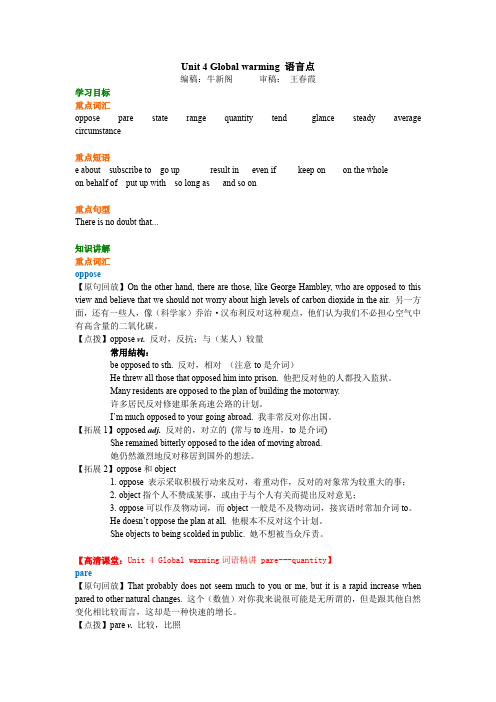
Unit 4 Global warming 语言点编稿:牛新阁审稿:王春霞学习目标重点词汇oppose pare state range quantity tend glance steady average circumstance重点短语e about subscribe to go up result in even if keep on on the wholeon behalf of put up with so long as and so on重点句型There is no doubt that...知识讲解重点词汇oppose【原句回放】On the other hand, there are those, like George Hambley, who are opposed to this view and believe that we should not worry about high levels of carbon dioxide in the air. 另一方面,还有一些人,像(科学家)乔治·汉布利反对这种观点,他们认为我们不必担心空气中有高含量的二氧化碳。
【点拨】oppose vt. 反对,反抗;与(某人)较量常用结构:be opposed to sth. 反对,相对(注意to是介词)He threw all those that opposed him into prison. 他把反对他的人都投入监狱。
Many residents are opposed to the plan of building the motorway.许多居民反对修建那条高速公路的计划。
I’m much opposed to your going abroad. 我非常反对你出国。
【拓展1】opposed adj.反对的,对立的(常与to连用,to是介词)She remained bitterly opposed to the idea of moving abroad.她仍然激烈地反对移居到国外的想法。
22版:Unit 4 Global warming(步步高)
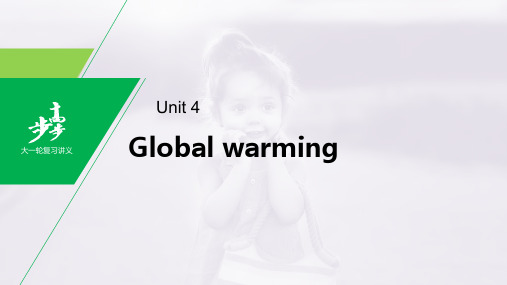
Ⅴ.核心短语(每小题2分,共20分)
26._c_o_m_e__a_b_o_u_t_
发生;造成
27._s_u_b_s_cr_i_b_e_t_o_
同意;赞成;订购
28._q_u_a_n_t_it_i_es__o_f
大量的
29._g_o_u_p_
上升;增长;升起
30._r_es_u_l_t_i_n_ 31._b_e_o_p_p_o_s_e_d__to_
adj.平稳的;持续的;稳固的 adv.平稳地;持续地 n.污染;弄脏 vt.污染 adj.被污染的 n.教育工作者;教育家 v.教育;培养 n.教育;培养
19._c_o_n_tr_i_b_u_t_io_n_ →_c_o_n_t_ri_b_u_t_e_ 20._d_is_a_g_r_e_e_m_e_n_t_ →_d_is_a_g_r_e_e_ →_a_g_r_e_e →_a_g_r_e_em__e_n_t_
adj.平均的
11._a_d_v_o_c_a_t_e
vt.拥护;提倡;主张
12._c_ir_c_u_m__s_ta_n_c_e_
n.环境;情况
Ⅲ.拓展单词(每小题2分,共16分)
13._te_n_d_
vi.趋向;易于;照顾
vt.照顾;护理
→_te_n_d_e_n_c_y_
n.倾向;趋势
14._o_p_p_o_s_e_
11.growth n.增长;生长 →grow v.种植;生长;发展 12.electrical adj.电的;与电有关的 →electricity n.电;电力 →electric adj.电的;电动的 →electronic adj.电子的 cator n.教育工作者;教育家 →educate v.教育;培养 →education n.教育;培养
【词汇讲解】英语Unit4Globalwarming
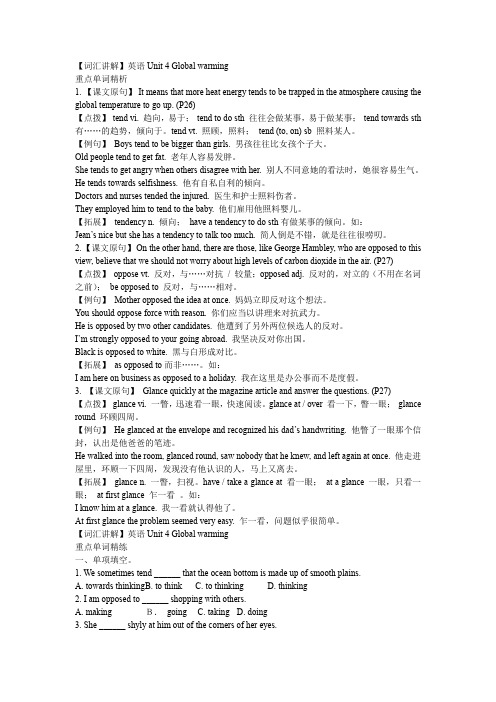
【词汇讲解】英语Unit 4 Global warming重点单词精析1. 【课文原句】It means that more heat energy tends to be trapped in the atmosphere causing the global temperature to go up. (P26)【点拨】tend vi. 趋向,易于;tend to do sth 往往会做某事,易于做某事;tend towards sth 有……的趋势,倾向于。
tend vt. 照顾,照料;tend (to, on) sb 照料某人。
【例句】Boys tend to be bigger than girls. 男孩往往比女孩个子大。
Old people tend to get fat. 老年人容易发胖。
She tends to get angry when others disagree with her. 别人不同意她的看法时,她很容易生气。
He tends towards selfishness. 他有自私自利的倾向。
Doctors and nurses tended the injured. 医生和护士照料伤者。
They employed him to tend to the baby. 他们雇用他照料婴儿。
【拓展】tendency n. 倾向;have a tendency to do sth有做某事的倾向。
如:Jean’s nice but she has a tendency to talk too much. 简人倒是不错,就是往往很唠叨。
2. 【课文原句】On the other hand, there are those, like George Hambley, who are opposed to this view, believe that we should not worry about high levels of carbon dioxide in the air. (P27)【点拨】oppose vt. 反对,与……对抗/ 较量;opposed adj. 反对的,对立的(不用在名词之前);be opposed to 反对,与……相对。
高中英语 Unit 4 Global warming Period 1 Warming Up and

Unit 4 Global warming单元要览本单元的中心话题是人类当今面临的环境问题,主要探讨了“全球变暖”和“节约能源”等方面的问题。
由于人类过多使用不可再生能源,大气中二氧化碳的含量逐年增加,导致全球气温上升。
通过学习本单元,让学生了解能源分为“不可再生能源”和“可再生能源”,帮助学生树立“节约能源、保护环境”的主人翁意识。
本单元的主要教学内容如下表所示:Period 1 Warming Up,Pre-reading,Reading and prehending整体设计教学内容分析This is the first teaching period of this unit.The central part of this period is the reading passage with the title of “The Earth Is Being Warmer—But Does It Matter?” talking about the global issue which has a great effect on human beings' life.Warming Up gives six pictures to help students list the sources of energy they can think of in our daily life.Then they will be led to discuss which energy source is “renewable” and which is “non-renewable”.This part is designed to help the students to recall their background knowledge about energy and prepares students for the whole unit.Pre-reading provides a picture of a greenhouse and then tells us what a greenhouse is and what “greenhouse gases” are.The students will be led to discuss what they think greenhouse gases do,leading to the topic of the reading passage.Reading is a passage from an environmental magazine for young people.It puts forward the possible effect of increased carbon dioxide in the atmosphere and different points of view about it.It also analyzes the causes of the earth's increased temperature.It poses questions and encourages students to think about the issues.There are two graphs in it that tell us the “temperature difference from long-term average,1860-2000” and “carbon dioxide content in the atmosphere,1957-1997”.Characters in the passage—Dr Janice Foster,George Hambley and Charles Keeling are all real persons and their views reflect the views of some scientists today.prehending consists of three written or oral exercises for the students to do so as to help the students to get a better understanding of the text,that is to say,to help the teacher to check how much the students have understood the text.三维目标设计Knowledge and skills1.To know the meanings of the following new words and phrases:consume(消费;消耗;耗尽),e about(发生;造成),random(胡乱的;任意的),phenomenon(现象),subscribe(同意;捐赠;订阅;签署文件),subscribe to(同意;赞成;订购),fuel(燃料),quantity(量;数量),quantities of (大量的),tend(趋向;易于;照顾),go up(上升;增长;升起),per(每;每一),data(资料;数据),result in(导致),trend(趋势;倾向),catastrophe(大灾难;浩劫),flood(洪水;洪灾),oppose(反对;反抗),opposed(反对的;对立的),be opposed to(反对),consequence(结果;后果),state(陈述;说明),range(种类;X围),even if(即使),keep on(继续),glance(看一下;扫视),steady(平稳的;持续的),steadily(平稳地,持续地)2.To learn about some facts and views about global warming.3.To learn how the information is organized.4.To develop the students' reading ability by skimming and scanning the passage.5.To develop the students' speaking ability by talking about global warming.Process and methods1.While doing Warming Up the teacher can lead in the topic of this unit by showing students some pictures or videos about sources of energy,making the students recall their own knowledge about energy.2.During Pre-reading the teacher can go around the classroom and discuss the questions with several students.This discussion should be student-centered and lead them to the topic of global warming.The teacher should also ask the students to look at the graphs in the reading passage and try to find out the general idea of the text.3.While doing Reading and prehending,the teacher may first ask the students to read the text quickly to get the general idea of each paragraph.After reading the passage,students are encouraged to answer some questions and discuss the text structure.4.To consolidate the contents of the reading passage,the students should be required to retell the text in their own words at the end of the class.Emotion,attitude and value1.To make students realize the harm of global warming and the importance of environmental protection.2.To develop students' sense of cooperative learning.教学重、难点1.To enable the students to learn about global warming and to develop their reading ability.2.To enable the students to talk about what we should do to prevent global warming.教学过程Step 1Warming up1.Warming up by reading and talking:Read through the exercise with the class.Put students in groups of four to talk about what we use energy for,what are the sources of these energy and whether the sources are renewable or non-renewable.Suggested answer:The six photos are:windmills;a coal power station;an oil refinery;a nuclear power plant;solar panels;a hydro-electric dam.2.Warming up by discussion:Draw a form on the blackboard as follows:Things that useSources of energy Renewable/non-renewableenergyLet the students have a discussion and collect suggestions from students and write them under the appropriate heading.Suggested answer:Things that use energy Sources of energy Renewable/non-renewablelightsheatingtelevision cassette player video recorderputerfridgestovehairdryer...coal non-renewableoil non-renewable natural gas non-renewable wind power renewable solar energy renewable nuclear energy non-renewable hydro-electricpowerrenewable biomass energy renewable geothermalenergyrenewable tidal energy renewableStep 2Pre-reading1.Show a picture of a greenhouse to students and ask them what a greenhouse is made of and what its purpose is.Suggested answer:It's made of glass and plants can grow in it when it's cold outside.Ask the students how it works.Suggested answer:The glass traps the heat from the sun,making the air warm so that plants grow better.2.Ask students what they think “greenhouse gases” are and what they think greenhouse gases do.Look at the picture above and explain it to their partners.Suggested answer:Greenhouse gases perform the same function as the glass in a glasshouse:they trap the heat of the sun and keep the air surrounding the earth warm.This is called the greenhouse effect.)Step 3Reading and prehending1.Fast readingAsk students to read the passage quickly so as to get the key words and general idea of each paragraph and answer the following questions:(1)What is the main topic of the article?________________________________________________________________________(2)Who wrote the magazine article?What is the name of the magazine?________________________________________________________________________(3)What are the names of the three scientists mentioned in the article?Do they agree with one another?________________________________________________________________________Suggested answers:(1)Global warming/the warming of the earth.(2)Sophie Armstrong,Earth Care.(3)Dr Janice Foster,Charles Keeling,George Hambley.They don't agree with each other.2.Detailed reading(1)Read the passage carefully and judge whether the statements are true(T) or false(F).①Janice Foster believ es that global warming is caused by the burning fossil fuels.( )②Natural gas is a greenhouse gas.()③Carbon dioxide is a byproduct of burning fossil fuels.()④People accept Charles Keeling's data because he took accurate measurements.()⑤Flooding could be one of the effects of future global warming.( )⑥George Hambley believes scientists are just guessing about the effects of global warming.( )⑦George Hambley is worried about the effects of carbon dioxide on plant growth.()⑧It is clear what the effec ts of global warming will be.( )(Suggested answers:TFTTTTFF)3.Structure analyzingAsk students to read the text carefully and try to find out how many parts they can divide the text into and find out the main idea of each part.Part Main ideaPart 1(Paragraph ______)Part 2(Paragraphs ______ to ______)Part 3(Paragraphs ______ to ______)Part 4(Paragraph ______)Suggested answer:Part Main ideaPart 1(Paragraph 1) To introduce a debate over the issue of global warming.Part 2(Paragraphs 2 to 5) To illustrate how global warming es about.To list two different attitudes among scientists towards Part 3(Paragraph 6)global warming.It's up to readers to think and decide whether people Part 4(Paragraph 7)should do something about global warming or not.Step 4Language studyDealing with any language problem if any(words or sentences students might not understand)to help the students to have a better understanding of the text.Step 5Listening,reading aloud and underliningAsk students to read the passage aloud to the tape and let them pay attention to the pronunciation of each word and the pauses within each sentence.Tell them to pick out all the useful expressions or collocations from the passage while reading and copy them to the notebook after class as homework.Collocations:e about,There is no doubt that...,subscribe to,due to,greenhouse effect,quantities of,tend to,be trapped in,go up,result in,on the one hand...on the other hand,be opposed to,build up,keep on.Step 6RetellingAsk students to talk about global warming in their own words.Give them some key words and expressions on the blackboard.Then let them try to retell the passage.Step 7Homework1.Learn the useful new words and expressions in this part by heart.2.Try to find some data about global warming on the Internet,and show your class in the next period and talk about them.Step 8Reflection after teaching________________________________________________________________________________________________________________________________________________教学参考About Global Warming(关于全球变暖)Global warming is the increase in the average temperature of Earth's near-surface air and oceans since the mid-20th century and its projected continuation.Global surface temperature increased 0.74±0.18℃(1.33±0.32)between the start and the end of the 20th century.The Intergovernmental Panel on Climate Change(IPCC)concludes that most of the observed temperature increase since the middle of the 20th century was very likely caused by increasing concentrations of greenhouse gases resulting from human activity such as fossil fuel burning anddeforestation.The IPCC also concludes that variations in natural phenomena such as solar radiation and volcanic eruptions had a small cooling effect after 1950.These basic conclusions have been endorsed by more than 40 scientific societies and academies of science,including all of the national academies of science of the major industrialized countries.Climate model projections summarized in the latest IPCC report indicate that the global surface temperature is likely to rise a further 1.1 to 6.4℃(2.0 to 11.5)during the 21st century.The uncertainty in this estimate arises from the use of models with differing sensitivity to greenhouse gas concentrations and the use of differing estimates of future greenhouse gas emissions.Most studies focus on the period up to the year 2100.However,warming is expected to continue beyond 2100 even if emissions stop,because of the large heat capacity of the oceans and the long lifetime of carbon dioxide in the atmosphere.An increase in global temperature will cause sea levels to rise and will change the amount and pattern of precipitation,probably including expansion of subtropical deserts.Warming is expected to be strongest in the Arctic and would be associated with continuing retreat of glaciers,permafrost and sea ice.Other likely effects include changes in the frequency and intensity of extreme weather events,species extinctions,and changes in agricultural yields.Warming and related changes will vary from region to region around the globe,though the nature of these regional variations is uncertain.Political and public debate continues regarding global warming,and what actions(if any)to take in response.The available options are mitigation to reduce further emissions;adaptation to reduce the damage caused by warming;and,more speculatively,geoengineering(地球工程)to reverse global warming.Most national governments have signed and ratified the Kyoto Protocol aimed at reducing greenhouse gas emissions.。
高考英语大一轮复习Unit4Globalwarming新人教版
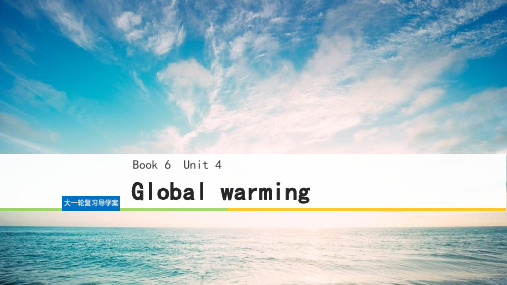
你决不能离开房子。 用法点拨
circumstance表示“情况,情形,环境”等,通常用复数。
cator
n.教育家;教育工作者
educate
vt.教育
education
n.教育
10.contribution n.贡献;稿件;捐赠物
话题佳作
假设你所在的学校英语角要举行一次以“低碳环保生活”为 主题的活动,用英语写一篇演讲稿,建议那些坐私家车上学的同 学采取更加环保的交通方式上学。要点如下:
1.私家车排放废气是空气污染的一个主要原因; 2.建议大家骑自行车、乘坐公交车等公共交通工具上学; 3.如果每个人都这样做,将是对环保极大的贡献。
内容索引
基础排查 点
点拨要
教材升华 综合运用
语篇训练 力
提升能
基础排查 点拨要点
1 重点单词
A.写作必记单词
1.oppose vt.反对;反抗;与(某人)较量
(1)beopposed
to反对……(to为介词)
(2)Could it be the pattern that two thingass moapkpeo,sed to
(相
对
于) three?
(3o)pIpnosCerdeation or Evolution,Michael Ebifegha examines these two
of empirical(实
(oppose) world views within the structure g7.pollution pollute
n.污染;弄脏 vt.污染
8.circumstance n.环境;情况
(1i)n/under in/under
no circumstances决不 any circumstances在任何情况下
Unit4 Global Warming教案电子教案

U n i t4G l o b a l W a r m i n g教案Unit4 Global WarmingTeaching aims: To make students realize the harm of global warming and how to protect the earth from global warming ;To develop students’ sense of cooperative ability;Teaching important points : To enable students to learn about global warming and to develop their reading ability.Teaching difficult points: To enable students to talk about what we should do toprevent global warming.Teaching aids: MultimediaTeaching procedures:Step1 Warming upTalk about weather and lead the relationship between severe cold weather and global warming.Then play a video and ask students to think about what the video shows so as to lead today’stopic-global warming.Step2 TalkingPlay a second video and the students are supposed to talk about what is happening in the video. Then the teacher comes to a conclusion:The animals’ habitats are destroyed. That means animals will die out one day.Step3 pre-readingAsk students questions:What is a greenhouse made of and used for?Have you ever seen a green house?A greenhouse is made of ______ and is used for ______________,especially during_____weather.Step4 group workAsk students to work in groups to discuss how does a greenhouse work?The answer:The glass traps the heat from the sun and keeps it from escaping. So the air inside is warm. This makes the greenhouse heat up and so the plants can grow throughout the cold period.Step5 reading•Ask students to skim the passage quickly and answer the following questions: What are the “greenhouse gases”?•Who talked about “greenhouse effect”?•What is greenhouse effect?•And then check the answers. And then ask them to read it again and work in pairs to answer :Can we live without greenhouse effect?•Who wrote the article?•What’s the name of the magazine?•What are the names of the three scientists mentioned in the article?•What did Charles Keeling find? And do you agree with her?•Does George Hambley agree with Dr Janice Foster?•What does Hambley say about carbon dioxide?Step5 detailed readingThe teacher tells that the test can be divided into 4 parts so show them a diagram and ask them to match which part with the right main idea.Step6 An activity—Make a posterSaving energy means reducing carbon dioxide, which is our duty.What should we do to slow down global warming?Make a poster for our school that tells students various ways they can reduce the amount of carbon dioxide in the air.Step7 Homework•Composition:•以“how to slow down global warming?”为题写一篇发言稿。
高一必修4unit4知识点

高一必修4unit4知识点高一必修4 Unit 4 知识点Unit 4: Global warmingUnit 4 is part of the required curriculum for students in their first year of high school. The unit focuses on the topic of global warming, which is a very important issue in today's world. In this unit, students will learn about the causes and effects of global warming, as well as possible solutions to this pressing problem.1. Introduction to global warmingGlobal warming refers to the long-term increase in Earth's average surface temperature. It is primarily caused by the release of greenhouse gases, such as carbon dioxide, into the atmosphere. This phenomenon has significant impacts on our planet, including rising sea levels, extreme weather events, and disruption of ecosystems.2. Causes of global warmingThe main driver of global warming is the burning of fossil fuels, such as coal, oil, and natural gas. When these fuels are burned, carbon dioxide is released into the atmosphere, trapping heat and causing the planet to warm. Deforestation and industrial processes also contribute to global warming by releasing greenhouse gases.3. Effects of global warmingGlobal warming has a wide range of effects on the environment and human societies. It leads to the melting of polar ice caps and glaciers, which results in rising sea levels. This poses a threat to coastal communities and low-lying areas. Additionally, global warming is responsible for more frequent and severe weather events, such as hurricanes, droughts, and heatwaves. It also disrupts ecosystems, causing species extinction and altering natural habitats.4. Solutions to global warmingAddressing global warming requires a collective effort from individuals, governments, and international organizations. Some key solutions include:- Transitioning to renewable energy sources, such as solar and wind power, which produce fewer greenhouse gas emissions.- Improving energy efficiency in buildings, transportation, and industries.- Promoting sustainable agriculture and reducing food waste.- Preserving and restoring forests, as they absorb carbon dioxide.- Encouraging international cooperation and agreements to reduce emissions and limit global warming.5. The role of individuals and educationIndividual actions can also contribute to the fight against global warming. For example, individuals can reduce their energy consumption, use public transportation, recycle, and choose sustainable products. Education plays a crucial role in raising awareness about global warming and empowering individuals to take action. By educating students about the causes, effects,and solutions of global warming, we can inspire future generations to protect the planet.Conclusion:Unit 4 provides students with essential knowledge about global warming and its impacts. By understanding the causes and effects of global warming and exploring possible solutions, students will be better equipped to face this critical challenge. It is our responsibility to take action and work towards a sustainable future for ourselves and future generations.(Note: This article is not based on any specific format, but highlights the key points and information related to the topic of "Unit 4: Global warming" in the high school curriculum.)。
高中英语《Unit 4 Global warmi

号顿市安谧阳光实验学校《Unit 4 Global warming》Ⅰ.选词填空If youdoor.2.Buy vegetables in small , for your immediate use.3.People to need less sleep as they get older.4.Most of us are to the death penalty.5.The government needs to clearly its policy on this issue.6.Even the cheapest property was out of our price .7.The man nervously at his watch.8.Paul is making progress.9.I asked a few questions of Ellen as we sat there.10.He broke the law,and now he must face the of hisactions.Ⅱ.单项填空1.The committee is totally opposed ______any changes being made tothe plans.A.of B.on C.to D.against2.We must take all possible measures________ to improve working conditions.A.to tend B.tending C.tended D.being tended3.He slipped and had his leg broken.________, he will have to be away from school for two or three months.A.In any case B.After all C.As a consequence D.In this way 4.The manager________ his eyes down the list of names quickly to see if anyone was left out.A.glared B.stared C.glanced D.looked5.Such fine work requires a good eye and a ________hand.A.calm B.fluent C.frequent D.steady6.He was so angry at that time that he shouted at anyonewithin________.A.limit B.range C.edge D.centre7.—What about Mary’s idea?—Very good! But not many people________ the idea that money brings happiness.A.subscribe to B.take to C.contribute to D.relate to8.________ is no doubt that Sophie will be able to win the first prize in the contest, for she is always studying hard.A.This B.It C.There D.Here9.Though it was raining, they ________working until it was finished.A.kept up B.kept on C.kept from D.kept out10.As is known to all, failure usually ________laziness while diligence can________ success.A.results from; lie in B.results in; result fromC.leads to; lie in D.results from; result inⅢ.阅读理解ATuvalu, a tiny country in the Pacific Ocean, has asked for help as it will be swallowed up by the sea.Storms and huge waves are a constant threat and none of Tuvalu’s nine little islands is more than five meters above sea level. Salt water is already entering the country’s drinking water supply, as well as damaging plants that produce fruit and vegetables. Without urgent help, the country’s days are numbered.But Tuvalu is not the first place to face sinking into the sea. Venice, a historic city in Italy best known for its canals, has sunk about 24cm over the past 100 years. Experts say that it will have sunk another 2050cm by 2050. A century ago, St. Mark’s Square, the lowest point city, flooded about nine times a year. Nowadays, it happens more than 100 times. While Venice is slowly sinking into the mud on which it stands, global warming causes Tuvalu’s rising sea level.The average global temperature has increased by almost 0.5 centigrade degrees over the past century; scientists expect it rise by extra 13 degrees over the next 100 years.Warmer weather makes glaciers (冰川 ) melt, adding more water to the ocean. The warmer temperatures also make water expand, so it takes up more space, causing the sea level to rise. The sea level has risen about 1025 cm in the last 100 years.The main cause of global warming is human pollution. Through burning coal, oil and gas, people have been increasing the greenhouse gases in the atmosphere, such as CO2. This adds to the power of the greenhouse effect, making the planet even warmer.Many scientists believe that, if the warming is not stopped, there will be huge climate changes. The sea level could rise by one meter thiscentury.Should this come true, the sea will swallow up millions of homes and the world will be flooded with “climate refugees” looking for somewhere to live.1. We can infer from the second paragraph that________.A.Tuvalu is in danger of being swallowed up by the seaB.all Tuvalu’s islands are about five meters above the sea level C.drinking water in Tuvalu has been destroyedD.Tuvalu is often flooded by storms and waves2.The author uses Tuvalu and Venice as examples in order to explain________.A.they are the first place sinking into the seaB.they are both sinking into the mud where they standC.they will disappear in the futureD.their trouble is caused by the global warming3.Put the following events in the right order.a.Glaciers began to melt.b.People burn coal, oil and gas.c.The greenhouse effect is growing.d.The earth is getting warmer and warmer.e.The sea level is rising.f.More CO2 is produced.g.Many places are sinking into the sea.A.d, f, b,c, a, e, g B.b, f, c, d, e, a, gC.f, c, b, d, a, e,g D.b, f, c, d, a, e, g4. What does “climate refugees” mean?A.People who are forced away from their homeland by climate.B.Climate changes.C.Rare animals.D.Climate effect.5. Which of the following is NOT true according to the passage?A.Tuvalu’s nine little islands are less than five meters above the sea level.B.The average global temperature has risen by 13 centigrade degrees over the past 100 years.C.The warmer temperature causes the sea level to rise.D.There will be huge climate changes unless the warming is stopped.BBEIJING, China —Pollution in China remains very serious as the country’s rapid economic growth brings new environmental problems, a minister said Saturday.Vice Environment Minister Zhang Lijun said China has made progress on environmental protection, but admitted that its rapid economic growth over the past decade has had a negative effect on the environment.“Our rapid economic development has continuously brought our country new environmental problems, particularly dangerous chemicals, electronic waste and so on. These environmental pollutants (污染物) bring new problems and affect human health,” Zhang told a news conference.He said that emissions (排放) of traditional pollutants remain high and some areas have failed to meet government standards.The minister noted that rapid development in the next five years would increase the need for China to improve environmental protection and shift to a more sustainable(可持续的) model of economic development from its dependence on industries which consume huge quantities of energy.China is focusing on clean energy, including solar, wind and nuclear power, as one way to reduce its dependence on coal, which generates threequarters of its electricity and is also used for winter heating in northern cities. China also hopes the strategy will reduce its demand for oil and gas and increase economic growth and jobs.Zhang told reporters there was no plan to adjust China’s overall strategy for nuclear development but he said Beijing will learn lessons from Japan after a violent earthquake resulted in a radioactive leak (放射能泄露).“Some lessons we learn from Japan will be considered in the making of China’s nuclear power plans,” he said. “But China will not change its determination and plan for developing nuclear power.”6.According to the minister, the pollution problem requires China to________.A.slow its economic developmentB.ask industries to meet government standardsC.protect the environment firstD.transform its economic development model7.According to the text, which of the following is TRUE?A.Rapid economic growth helps to improve the environment.B.Dangerous chemicals are one of the traditional pollutants.C.Coal is used more in northern cities than in southern cities.D.The use of clean energy will help increase job opportunities.8.The underlined word “generates” in Paragraph 6means“________”.A.reduces B.transports C.produces D.needs9. What do the last four paragraphs mainly talk about?A.Japan had a violent earthquake recently.B.China will learn to use nuclear power from Japan.C.Rapid economic growth caused some problems in China.D.China’s economic development will shift to depend on clean energy.10. What is Zhang’s attitude towards what happened in Japan?A.He is astonished at it and feels pity for the Japanese people.B.He thinks Japan should do something to prevent it happening again.C.He thinks China will pay more attention to nuclear safety.D.He doe sn’t think it will affect China’s nuclear power plans at all.参考答案:Ⅰ.选词填空1. subscribe2. quantities3. tend4. opposed5. state6. range7. glanced8. steady9. random10. consequencesⅡ.单项填空1. 解析:选C。
课件3:Unit 4 Global warming
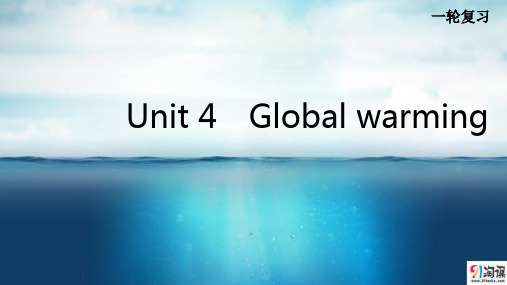
Ⅴ.语篇填空 However, the attitude of scientists towards this rise is completely different. On the one hand, Dr Foster thinks that the trend which increases the temperature ①________ 5 degrees would be a catastrophe. She says, “We can't predict the climate well enough to know what to expect, ②________ it could be very serious.” Others ③ ________ agree with her think there may be a rise of several metres in the sea level, or predict severe storms, floods, droughts, famines, the spread of diseases and the ④________ (disappear) of species.
一轮复习
Unit 4 Global warming
Ⅰ.单词速记 A.快速识记
1.__q_u_a_n_t_it_y___ n.量;数量 2.___r_a_n_g_e_____ n.范围;种类 3.c_ir_c_u_m__st_a_n_c_e__ n.环境;情况 4.w__id__es_p_r_e_a_d___ adj.分布广的;普遍的 5.___g_la_n_c_e_____ vi.看一下;扫视 n.一瞥 6.__c_o_n_su__m_e____ vt.消费;消耗 →__c_o_n_s_u_m__e_r____ n.消费者
学案8:Unit 4 Global warming

Unit 4 Global warming重点词汇总结pare: 比较,对比;compare A to B:把A比作B;compare A with B: 把A与B进行比较;We often compare children to flowers.e about: 发生,产生(没有被动语态,有时用it作形式主语,后跟that引导的主语从句);区别:happen: (偶然)发生,没有被动语态,较多用来指某个事件的突然发生,强调其偶然性,主语往往是事件,事故等。
take place: 发生,举行,常指有计划安排的事情的发生与进行,不含偶然性。
come about: 侧重于指事件发生的原因,常与how连用。
break out: 发生,爆发,常指战争、灾难、疾病或争吵等事件的发生,也可以表示突然大声叫喊。
occur: 可指偶然发生,也指计划发生某事,还表示突然想到,常用于it occurs to sb. that…结构中。
come on: 加油come up: 过来come across:偶遇,遇到come along:进展come round: 恢复知觉,苏醒come up with: 提出I come across the children sleeping under the bridge.How did it come about that you were an hour late?3.subscribe: 同意,捐助,订阅;subscribe for: 订阅,认购;subscribe to: 赞同,同意Are you going to subscribe to the opera this season? 你要购买这一季的歌剧票吗?He did not subscribe to my proposal? 他不赞同我的建议。
4.quantities of: 大量的,许多的;a quantity of: 许多的,大量的;in quantity:大量的,许多的;in large quantities: 大量的quantities of与a quantity of区别:二者都有“大量的”意思,即可修饰可数名词,又可修饰不可数名词,但用法有区别。
高考英语大一轮复习 基础晨记提升 Unit 4 Global warming

毛额市鹌鹑阳光实验学校【走向高考】(12省专用)2015高考英语大一轮复习基础晨记提升 Unit 4 Global warming 新人教版选修6Ⅰ.单词速记A.识记单词1.________ (adj.) 胡乱的;任意的2.________ (n.) 种类;范围3.________ (vi.) 看一下;扫视(n.) 一瞥4.________ (adj.) 分布广的;普遍的5.________ (adj.) 平均的6.________ (vt.) 拥护;提倡;主张7.________ (adj.) 随便的;漫不经心的;偶然的8.________ (n.) 环境;情况9.________ (vt.) 使恢复;使振作B.联想串记10.________ (n.)现象→________ (pl.)现象11.________ (n.)量;数量→________ (n.)质量12.________ (vi.)趋向;易于;照顾(vt.)照顾;护理→________ (n.)倾向;趋势13.________ (vt.)反对;反抗;与(某人)较量→________ (adj.)反对的;对立的14.________ (n.)结果;后果;影响→________ (adv.)因此;所以15.________ (vt.)陈述;说明→________ (n.)说明;说法;表白16.________ (adj.)平稳的;持续的;稳固的→________ (adv.)平稳地;持续地17.________ (n.)生存;存在→________ (vi.)存在18.________ (n.)贡献→________ (v.)贡献;撰稿答案:1.random 2.range 3.glance 4.widespread 5.average 6.advocate 7.casual 8.circumstance 9.refresh 10.phenomenon;phenomena 11.quantity;quality 12.tend;tendency13.oppose;opposed 14.consequence;consequ ently 15.state;statement 16.steady;steadily 17.existence;exist 18.contribution;contribute Ⅱ.短语互译1.发生;造成 ________________2.上升;增长;升起 ________________3.即使 ________________4.大体上;基本上 ________________5.代表……一方;作为……的代言人 ________________6.忍受;容忍 ________________7.只要 ________________8.rather than ________________9.subscribe to ________________10.quantities of ________________11.result in ________________12.be opposed to ________________13.keep on ________________14.and so on ________________答案:e about 2.go up 3.even if 4.on the whole5.on behalf on 6.put up with 7.so long as 8.而不是9.同意;赞成;订购10.大量的11.导致12.反对……13.继续14.等等Ⅲ.典句忆析A.完成句子1.There is no doubt that...毫无疑问……________________ (毫无疑问) the earth is becoming warmer...2.强调句________________ (是人类活动) has caused this global warming rather than a random but natural phenomenon.3.介词短语引导的含蓄虚拟条件句Without the “greenhouse effect”, the earth ______________ (将比现在的温度还要低大约33摄氏度).4.even if引导让步状语从句________________ (即使) we start reducing the amount of carbon dioxide and other greenhouse gases, the climate is going to keep on warming for decades or centuries.5.as/so long as引导条件状语从句It is OK to leave an electrical appliance on ______________(只要) you are using it—if not, turn it off!6.it takes...to do sth.________________ (需要大量能源) to make things from new materials, so, if you can, buy things made from recycled materials.B.典句仿写1.毫无疑问,礼貌的行为受欢迎。
课件5:Unit 4 Global warming

occur
多指意想不到的事情的发生,用作此意时一般 不和happen换用
选词填空(come about, happen, take place, break out, occur)。 ①Great changes have __________ in Guangzhou since Asian Games. ②How did it __________ that you were an hour late on such a short trip? ③A fire ________ during the night, which caused a lot of damage. ④Luckily the earthquake didn't __________ in the center of the city.
答案:①taken place ②come about ③broke out ④happen/occur
2.result in导致;造成……的结果 知识链接 result in 引起;导致;造成某种结果 result from 由……引起
选词填空(result from, result in)。 ①Much new and high technology has been introduced from America, thus ________ ________ a great increase in production of the company. ②As is known to us all, failure usually ________ ________ laziness while diligence can ________ ________ success.
